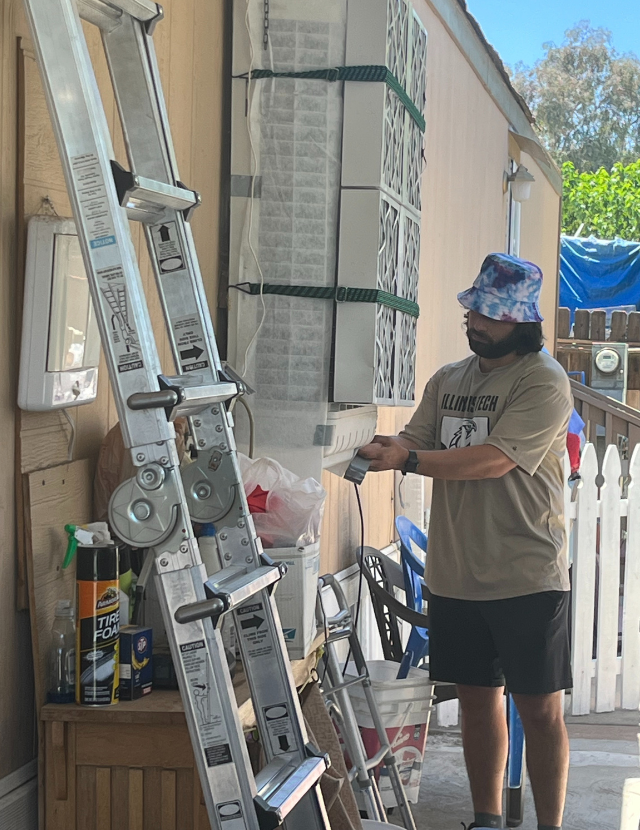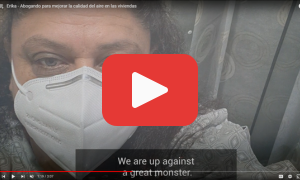Community Members in California’s San Joaquin Valley are Breathing Cleaner Air due to a New Air Filtration System
Highlights

Community members in California's San Joaquin Valley have documented serious health challenges and inequities as a result of breathing in harmful air pollutants from wildfire smoke, while in their homes. A new home DIY filtration system has shown improvements in their indoor air quality and has had a positive impact on their health and their family's health.
-
Focus Areas
Environmental Health -
Issues
Wildfires & Extreme Heat -
Expertise
Research – Surveillance
Community members reported breathing cleaner air, thanks to the FRESSCA home air filter initiative
Climate change has caused warmer and drier conditions, leading to a higher number of and more intense wildfires in California and throughout the nation. California’s San Joaquin Valley already experiences some of the worst air quality in the nation and its surrounding mountain ranges trap wildfire smoke, creating high concentrations of harmful particulate matter that can last for many weeks.
During the hot months and wildfire season, many low-income families and agricultural workers in the San Joaquin Valley rely on evaporative or “swamp” coolers in their homes. Filtration options don’t exist on the commercial market for residential swamp coolers, and families have been forced to breathe in unhealthy and dangerous air from wildfires and other air pollutants, while in their homes.
The Filtration for Respiratory Exposure to Wildfire Smoke from Swamp Cooler Air (FRESSCA) Mujeres study helps to address these challenges and aims to reduce wildfire smoke exposure and health risks among agricultural workers and low-income families by designing and field testing an affordable, effective filtration system for swamp coolers, and working with families so they can learn to install them on their own.
Families noticed a difference and initial readings indicate more than a 50% decrease in particle pollution after installing the filtration systems. Preliminary results of the study show that both swamp cooler filters and indoor air cleaners improved indoor air quality in the homes by lowering levels of PM10 and PM2.5 when outdoor levels were high.
Farmworker leaders in the San Joaquin Valley documented the health impacts from inhaling harmful air pollutants from wildfire smoke, while in their homes. They discuss how the FRESSCA home air filtration system is making a difference and improving their health. Watch their digital stories below.
I can see a big difference. My son's coughing problems have been decreasing because the air is cleaner. The filters that were installed also help keep out dirt and mosquitoes.Veronica Lopez
Coalinga, California
Advocating to Improve Indoor Air Quality / Abogando para mejorar la calidad del aire en las viviendas - Erika Montejano
 "We are up against a great monster. The poor air quality is a silent killer. We breathe the smoke from the fires. It’s the filter [that] is telling us that it is poison for our body to smell black smoke. That smoke is what causes damage to one’s lungs…kidneys…and everything. Now I see the difference that has been made by using an air filter in my house."
"We are up against a great monster. The poor air quality is a silent killer. We breathe the smoke from the fires. It’s the filter [that] is telling us that it is poison for our body to smell black smoke. That smoke is what causes damage to one’s lungs…kidneys…and everything. Now I see the difference that has been made by using an air filter in my house."
Watch the video in Spanish with English subtitles →
Lost Hills - Saul Ruiz
 “When the fire occurred in August 2023, it was a huge nightmare. At night when my children went to bed, I told them it was better to endure the heat, than to die of suffocation. With a lot of effort we pressured the company Wonderful to purchase air filters for homes in Lost Hills. We had enough people with asthma like my daughter, and the elderly… Between that filter and the filter that my wife got for our cooler, the air in my house improved a lot.”
“When the fire occurred in August 2023, it was a huge nightmare. At night when my children went to bed, I told them it was better to endure the heat, than to die of suffocation. With a lot of effort we pressured the company Wonderful to purchase air filters for homes in Lost Hills. We had enough people with asthma like my daughter, and the elderly… Between that filter and the filter that my wife got for our cooler, the air in my house improved a lot.”
Watch the video in Spanish with English subtitles →
Addressing the Dangerous Health Effects of Indoor Wildfire Smoke
In California’s San Joaquin Valley, agricultural workers are on the frontlines harvesting food for the nation and spend long hours working outdoors during dangerous wildfire smoke conditions. Many workers rely on swamp coolers during the summer months, where temperatures are unbearable, and as a result the coolers pull in large amounts of smoke and other air pollutants, forcing the workers and their families to breathe in unhealthy indoor air.
As a result of these harsh conditions, agricultural workers experience some of the greatest health consequences, such as higher risks of developing asthma and difficulties in managing it, heart attacks, strokes and related mental health challenges. Growing research has also made the connection of air pollution and carcinogens found in wildfire smoke to elevated risk of breast cancer in women.
FRESSCA Mujeres grew out of the concerns from farmworker women in California’s San Joaquin Valley who face multiple factors which increase their risk of adverse health outcomes, including breast cancer. Many of them are also exposed to other environmental hazards and environmental injustices at work, in their communities and homes. Listen to more of their stories.
During the summer of 2020, wildfire smoke from four major fires—SCU Lightning Complex Fire, Caldor Fire, Creek Fire, and the August Complex Fire—converged at the same time, creating hazardous smoke with extreme heat in Central Valley communities for several weeks.
The Central California Environmental Justice Network (CCEJN), a community partner on the FRESSCA Mujeres project, heard from many community members in the San Joaquin Valley who expressed serious health concerns as a result of indoor air pollution from the four fires. Community members shared that they didn’t know what to do—they couldn’t breathe due to the smoke and their swamp coolers were pulling in and circulating dirty and polluted air from the wildfires. Community members also expressed the heat was so intolerable which is why they had to resort to running their swamp coolers.
In response to these concerns, CCEJN and PHI’s Tracking California—including members of PHI’s Tracking California and Achieving Resilient Communities programs—partnered on a grant proposal and were funded by the U.S. Environmental Protection Agency’s Science to Achieve Results (STAR) program and California Breast Cancer Research Program to develop the FRESSCA Mujeres project in Fresno, Kern and Kings counties in the San Joaquin Valley.
FRESSCA Mujeres is a unique partnership involving researchers, community partners and community members—all of whom are women. The project also involves the following other partners:
- California Department of Public Health Environmental Health Laboratory
- University of California, San Francisco
- Illinois Institute of Technology, Built Environment Research Group
- California Office of Environmental Health Hazard Assessment
Over the course of the project, 57 participant homes were included in the study. FRESSCA Mujeres has implemented a filtration solution for external installation on 25 participant evaporative coolers and air cleaners in 48 homes.
Researchers and community partners are also assessing the effectiveness of air quality solutions using continuous monitoring for particulate matter, particle deposition monitoring and questionnaires. They’re evaluating how well residential air filtration reduces overall exposures to these pollutant—under normal conditions and during a wildfire event—in homes that use evaporative or swamp coolers.
As part of the community-based participatory research project, researchers are tracking biomarkers for chemicals present in participants that indicate exposure to air pollution, as well as biomarkers of potential breast cancer risk.
About the Digital Stories
The Digital Story Project was led by the StoryCenter and supported by community members in the San Joaquin Valley, the Central California Environmental Justice Network and PHI’s Tracking California program. Farmworker leaders from the San Joaquin Valley documented their personal lived experiences in the form of digital stories, highlighting the impacts of air pollution from wildfire smoke and other environmental health challenges that compound these issues and make it difficult to achieve optimal health.
Work With Us
You change the world. We do the rest. Explore fiscal sponsorship at PHI.
Support Us
Together, we can accelerate our response to public health’s most critical issues.
Find Employment
Begin your career at the Public Health Institute.

